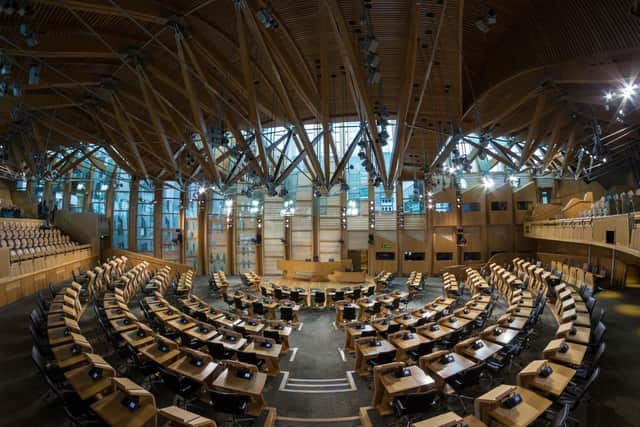Bad laws written in flimsy terms undermine the founding purpose of Holyrood - Susan Dalgety
“The power base of the Parliament – its essential reason for existence – will be its wide ranging legislative powers. These will touch every aspect of Scottish life,” read the final report of the Scottish Constitutional Convention, approved on 30 November 1990.
It’s worth repeating. The essential reason for the existence of the Scottish Parliament was, and remains, its wide ranging legislative powers. MSPs have other duties of course. They must scrutinise the work of the government, check and approve the government’s budget, and debate the important issues of the day.
Advertisement
Hide AdAdvertisement
Hide AdBut at its heart – the reason why thousands of Scots campaigned for, and won, the right to reconvene a Scottish parliament after 300 years – was to make laws that would improve the lives of the people of Scotland.
Scotland had, after all, kept its separate legal system following the Act of Union in 1707. Some might even argue that it was this anomaly – a legal system without a legislature – that led eventually, inevitably, to devolution. Law-making is central to Holyrood’s very existence.
Yet, in recent years, we have witnessed a series of bad laws passing through the Scottish Parliament, only to be later struck down or amended in the courts, repealed in parliament or simply not enacted. The “named person” scheme, a central part of the Children and Young People Act. The Offensive Behaviour at Football and Threatening Communications Act. The Railway Policing Act.
The latest of these inadequate, incompetent laws is the Gender Recognition Reform Bill, which is currently making its way through parliament.
I make no apologies for returning to the controversy over gender. It’s a live issue. The first deadline for amendments to the bill is in a few days’ time at midday on Wednesday 9 November.


It’s central tenet – that anyone over the age of 16 can change their legal sex by simple declaration after having lived in their “acquired gender” for only 12 weeks – has sparked a fierce national debate.
Grassroots women’s rights campaigners have clashed with government-funded organisations. The most famous women in the land – author JK Rowling and First Minister Nicola Sturgeon – have publicly argued over the bill. And last week, it led to the first serious rebellion among SNP ranks since the party came to power in 2007.
The bill, in its current form, is so inadequate and has such far-reaching consequences that some senior parliamentarians believe it will end up in the courts. And many MSPs seem content to outsource their democratic duty in this way, happy for appointed judges to occupy their “power base”.
Advertisement
Hide AdAdvertisement
Hide AdThis is despite repeated attempts by campaigners to point out the deficiencies of the bill. Only this week, 17 organisations, ranging from the Scottish Feminist Network to policy experts MurrayBlackburnMackenzie, sent a four-page letter to the leaders of Scottish Labour and the Conservatives, pointing out the bill’s worst defects. These include its interaction with the 2010 Equality Act, the lack of definition of “acquired gender” and unresolved cross-border issues.
“We have tried over a long period – often with great difficulty and facing extraordinary hostility – to draw political attention to where the largest risks lie from legislating badly,” wrote the campaigners, adding that trust in the legislative process is eroding. “This cannot be healthy,” they conclude.
Why has the Scottish Parliament got laws so wrong, so often in the past? And why is the gender reform bill so faulty that Scottish Labour’s Jackie Baillie, an MSP since 1999, admitted in parliament last week that “it is in the nature of these things that there will undoubtedly be challenges in the courts”?
It may be the drafting of the bill is slapdash. The reason for its introduction was to make it easier for people to change their legal sex after living in their acquired gender for three months. Yet the bill does not define what this means. Does a man become a woman simply by changing his name from Simon to Simone and swapping his brogues for kitten heels? No-one from the Scottish government appears to have an answer, yet they are prepared to legislate on such flimsy terms.
It has become obvious in the years since 1999 that the parliament’s committee structure is not up to the serious task of scrutinising proposed bills, or for that matter properly holding the government to account. Half of the parliament's current 16 committees – including Equalities, Human Rights and Civil Justice which is responsible for overseeing the gender bill – are chaired by members of the ruling parties, the SNP and Scottish Greens.
And with no second chamber to revise legislation – as is done by the House of Lords at Westminster – there is an inherent risk that the only practical way legislation can be tested is through the courts, but that comes at a price. Court action is not cheap.
But perhaps the biggest fault line in Scotland’s governance at present is the unwillingness of the government to engage with anyone who might have an opposing view from that of the First Minister.
The gender reform bill is a case in point. Civil servants and politicians seem reluctant to talk to their counterparts in Whitehall and Westminster. They refused, until recently, to engage with anyone in Scotland who did not support the bill, and even now their dialogue with critics is cursory. Discussion is curtailed, debate shut down, battle lines drawn, even within the SNP group.
Advertisement
Hide AdAdvertisement
Hide AdThe inevitable result of this control freakery is bad law and poor governance, and with the gender bill, legislation that risks damaging people’s lives.
A far cry from the “honourable aspirations for a new forum of democracy” promised by Donald Dewar at the opening of Holyrood only 23 years ago.